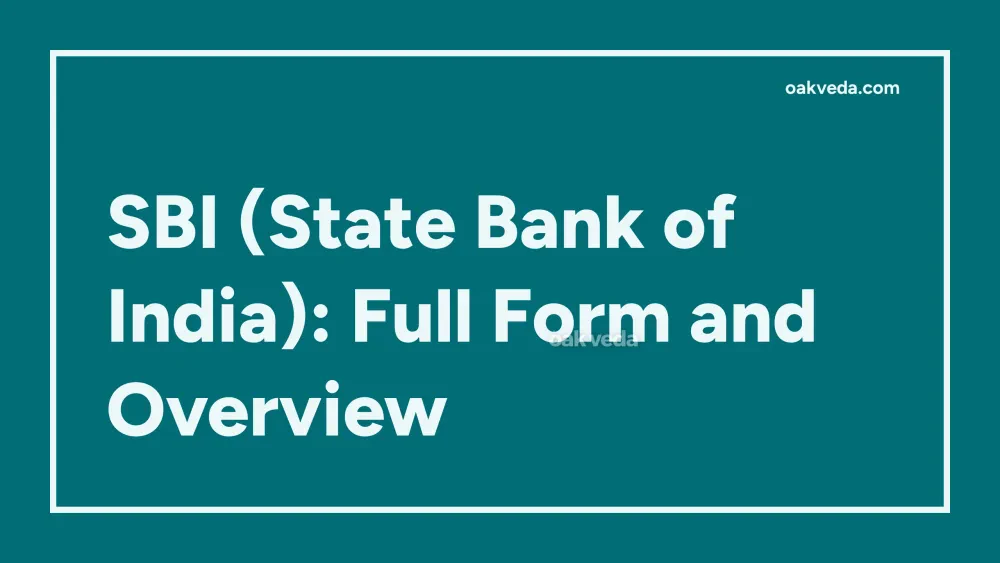
What is the Full Form of SBI?
The full form of SBI is State Bank of India. This acronym represents India's largest and oldest public sector bank, which has played a pivotal role in the country's financial landscape for over two centuries.
What is State Bank of India?
State Bank of India (SBI) is a premier financial institution that serves as the backbone of India's banking sector. As a government-owned corporation, SBI offers a wide array of banking and financial services to individuals, businesses, and government entities. Its extensive network of branches and digital platforms makes it accessible to millions of customers across India and beyond.
Origin and Development of State Bank of India
The roots of SBI can be traced back to the British colonial era. Its ancestry begins with the Bank of Calcutta, established in 1806, which was one of the three Presidency banks founded by the British in India. These banks merged in 1921 to form the Imperial Bank of India. Following India's independence, the Reserve Bank of India acquired a controlling interest in the Imperial Bank, leading to the birth of the State Bank of India on July 1, 1955.
Since its inception, SBI has grown exponentially, absorbing several banks and expanding its services. In 2017, SBI merged with five of its associate banks and Bharatiya Mahila Bank, further solidifying its position as India's banking giant.
How does State Bank of India work?
SBI operates on a multi-tiered structure, with its headquarters in Mumbai and a vast network of branches across India and international locations. The bank functions under the guidance of its Board of Directors and is led by a Chairman appointed by the Government of India.
Key aspects of SBI's operations include:
- Retail Banking: Offering savings accounts, loans, and other financial products to individual customers.
- Corporate Banking: Providing specialized services to businesses and large corporations.
- International Banking: Facilitating cross-border transactions and serving Indian interests abroad.
- Digital Banking: Embracing technology to offer internet and mobile banking services.
- Government Business: Acting as an agent for various government transactions and schemes.
Types of Services Offered by State Bank of India
SBI offers a comprehensive range of financial services, including:
- Deposit accounts (savings, current, fixed deposits)
- Loans (personal, home, education, vehicle)
- Credit cards
- Investment products (mutual funds, insurance)
- Foreign exchange services
- Digital banking solutions
- Corporate finance and advisory services
Functions of State Bank of India
As India's leading bank, SBI performs several crucial functions:
- Financial Intermediation: Mobilizing savings and channeling them into productive investments.
- Credit Creation: Providing loans to various sectors of the economy.
- Payment and Settlement: Facilitating smooth transactions within the economy.
- Policy Implementation: Assisting in the execution of monetary policies.
- Financial Inclusion: Extending banking services to underserved areas and populations.
Applications of State Bank of India Services
SBI's services find applications across various domains:
- Personal Finance: Helping individuals manage their money, save, and invest.
- Business Growth: Supporting enterprises with working capital and expansion loans.
- Infrastructure Development: Financing large-scale projects crucial for national growth.
- Agricultural Support: Providing credit to farmers and agri-businesses.
- International Trade: Facilitating import-export transactions through forex services.
Features of State Bank of India
Some distinctive features of SBI include:
- Extensive Network: Boasting the largest number of branches and ATMs in India.
- Government Backing: Enjoying the trust and support of the Indian government.
- Technological Innovation: Pioneering digital banking solutions in India.
- Diverse Product Portfolio: Offering a wide range of financial products and services.
- Global Presence: Operating in multiple countries to serve the Indian diaspora.
Benefits of State Bank of India
Customers and the economy at large benefit from SBI in several ways:
- Financial Security: Government backing ensures the safety of deposits.
- Competitive Rates: Offers attractive interest rates on deposits and loans.
- Convenience: Provides easy access through its vast network and digital platforms.
- Comprehensive Services: Acts as a one-stop solution for various financial needs.
- Economic Growth: Plays a crucial role in funding development projects.
Limitations or Challenges of State Bank of India
Despite its strengths, SBI faces certain challenges:
- Bureaucratic Processes: Sometimes criticized for slower decision-making.
- Non-Performing Assets: Dealing with the issue of bad loans.
- Competition: Facing increasing competition from private and foreign banks.
- Technological Adaptation: Keeping pace with rapidly evolving fintech innovations.
- Customer Service: Striving to improve service quality across its vast network.
Future Developments in State Bank of India
Looking ahead, SBI is focusing on several key areas:
- Digital Transformation: Enhancing its digital offerings to stay competitive.
- Artificial Intelligence: Implementing AI for improved customer service and risk management.
- Sustainable Banking: Increasing focus on green financing and sustainable practices.
- Global Expansion: Strengthening its international presence to serve a global clientele.
- Financial Inclusion: Developing innovative products to reach unbanked populations.
FAQs on SBI Full Form
-
What is the full form of SBI in Hindi? The full form of SBI in Hindi is भारतीय स्टेट बैंक (Bhartiya State Bank).
-
Is SBI a government or private bank? SBI is a public sector bank, majority-owned by the Government of India.
-
When was SBI established? SBI was established on July 1, 1955, but its origins date back to 1806.
-
How many branches does SBI have? As of 2023, SBI has over 22,000 branches across India.
-
Can NRIs open an account with SBI? Yes, SBI offers specialized NRI banking services, including various types of accounts for non-resident Indians.
In conclusion, the full form of SBI - State Bank of India - represents more than just a name. It embodies a financial institution that has been instrumental in shaping India's economic landscape. As SBI continues to evolve and adapt to changing times, it remains a cornerstone of the Indian banking system, serving millions and contributing significantly to the nation's financial growth and stability.
You may be interested in:

